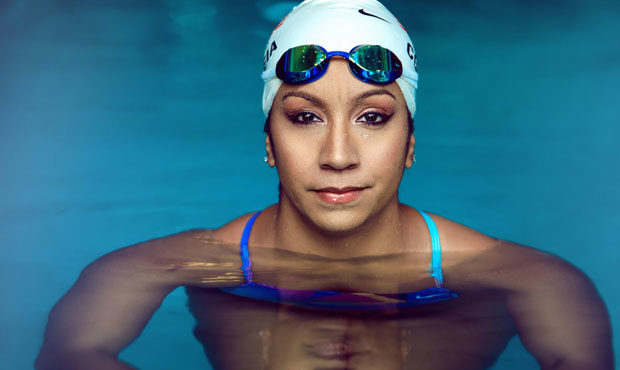Olympic ban on swim caps for Black hair ‘offensive, discriminatory,’ says Seattle founder of Afro Swimmers
Jul 15, 2021, 5:22 PM | Updated: Jul 16, 2021, 2:00 pm

Olympic medalist, Maritza McClendon, says 64% of African American children can't swim. She believes the swim cap ban is just another barrier. (Photo courtesy of Maritza McClendon)
(Photo courtesy of Maritza McClendon)
There has always been only one kind of swim cap.
“But those caps were not made for us,” said Seattle’s Noelle Ndiaye, swim coach and founder of Afro Swimmers, a movement to make swimming accessible to everyone. “They weren’t made for people with locs, they weren’t made for people with afros, with curly, textured hair.”
Now there are a few brands making slightly larger, more flexible swim caps that have room for bigger, more textured hair. One of them is Soul Cap. The British company submitted their cap for approval to the International Swimming Federation (FINA), so it could be worn by swimmers competing at the 2021 Olympic Games.
But FINA rejected the product, saying the design does not fit, “the natural form of the head” and “the athletes competing at the international events never used, neither require … caps of such size and configuration.”
It should be noted that the shape of the Soul Cap gives no athletic advantage.
“This conversation of Black hair being accepted in society is not new,” said Ndiaye. “So for FINA to take a swim cap that was literally made to break down barriers and make Black and brown people with curly textured hair feel more comfortable in the water, for them to make a decision and say that it was not necessary? It was offensive and it was discriminatory.”
“More importantly, they were making a decision for a community that wasn’t represented in their organization,” she continued. “How many Black people were in the room while they were discussing what Black people need in order to feel comfortable swimming in the water? Black people are not represented within the International Swimming Federation.”
Maritza McClendon is a 2004 Olympic silver medalist and the first Black female to make the US Olympic swim team. She has since retired from competitive swimming and now chairs The Black Leadership in Aquatics Coalition. She believes banning a swim cap intended for Black hair is one more way to keep Black people out of the pool.
“My biggest passion has been making sure that people who look like me also learn how to swim,” said McClendon. “The statistics for Black people in swimming is pretty alarming. Sixty-four percent of African-American children don’t know how to swim. As a person who broke barriers at the elite level, I want to make sure that kids who look like me know that it’s really important that they learn how to swim.”
McClendon and Ndiaye say the history behind that statistic runs deep.
“You have to understand that they did not want the slaves to know how to swim because if they could, that meant they could escape,” said Ndiaye. “Fast forward to Jim Crow and segregated pools.”
“There is a very common incident that happened where Black people were swimming and a white guy came and poured acid into the pool,” McClendon said.
“Now we are still seeing those barriers,” Ndiaye said. “The fear, the trauma, the hurt has been passed down from generation to generation. Teenagers and children, to this day, don’t want to swim because their parents didn’t swim and their parents parents didn’t swim.”
A debate over a swim cap may sound trivial, but Ndiaye says it’s a symbol for something bigger.
“It really isn’t about the hair,” Ndiaye said. “It’s about people not being willing to accept what’s different. It’s about people who don’t want to change. But we’re going to have to change. Swimming is a life skill and I believe it is a human right that every single person and child on the face of this Earth knows how to swim. It is the only sport that will save your life.”
Listen to Rachel Belle’s James Beard Award nominated podcast, “Your Last Meal.” Follow @hellorachelbelle on Instagram!













